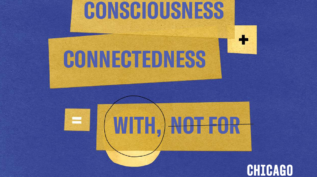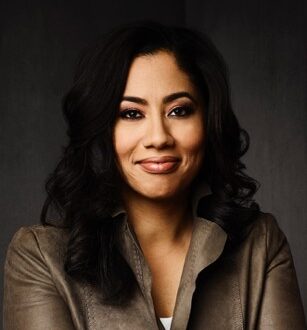From education to thought leadership around transforming philanthropy and systems, Liz Dozier has spent her career working tirelessly to support young people by disrupting the culture of inequity that is often pervasive in urban neighborhoods.
In 2016, Liz founded and launched Chicago Beyond, a philanthropic organization that works to ensure all young people and community members are free to live full lives. Because there is no single barrier to equity, Chicago Beyond engages in opportunities across justice, philanthropy, education, and beyond. Since its inception, the organization has invested more than $49 million in almost 200 individuals and community organizations while leading national systems change efforts by designing, supporting, and building out community driven solutions.
Chicago Beyond’s investments include transformative, trust-based grants and strategic thought partnerships. They work with hyperlocal, grassroots leaders and organizations who provide opportunities and drive systems change on behalf of young people and communitiy members. Investment partners drive a wide range of programs across environmental justice, leadership development, job training, financial literacy, food security, re-entry support, after-school programs, LGBTQ+ safe spaces, art classes, wellness, healing and much, much more. One investment partner is Centro Sanar, whose work serves as a nationally replicable model to increase access to mental health care for the LatinX communitiy. Other investmentments include a Leader in Residence program, Multi-Year Investment Partners, and a Rapid Response Fund.
Chicago Beyond pioneered an innovative approach called Whole Philanthropy, which is grounded in justice, and disposes of the traditional “us and them” model of philanthropy. The approach re-centers humanness in philanthropy thus enabling the team to forge deep connections with partners, rebuild partner ownership, and unlock the abundance of collective and often untapped resources among stakeholders.
Chicago Beyond also works in collaboration with people with lived experience to drive systems change efforts in justice, philanthropy, education and beyond. Along with the Cook and San Francisco Sheriffs’ Offices, Chicago Beyond launched the Holistic Safety Action Alliance, a coalition to reduce physical and emotional isolation for people working and confined within correctional walls. The team previously partnered with community members, researchers, foundations and others to develop Why Am I Always Being Researched?, a guidebook that offers a more equitable way to conduct research and address the universal power dynamics that exist within the nonprofit space. Some of Chicago Beyond’s other system change initiatives include to drive equitable funding nationwide, and the Healing Centered Framework, to instill healing for students in the Chicago Public Schools District.
In 2008, Dozier was selected by Arne Duncan, CEO of Chicago Public Schools at the time and later U.S. Secretary of Education, to participate in a bold strategy to improve Chicago’s lowest performing schools, known as the Turnaround Model. When Dozier became the principal of Fenger High School, she was keenly aware of how traumatic events outside of the classroom were affecting her students. As such, she adopted restorative justice and mental health and wellness strategies, implemented grief counseling, and provided anger group therapy sessions for students. Under Dozier’s leadership, Fenger was the first school in Chicago to institute CARE Teams to surround youth in crisis, and the entire staff at Fenger was trained in de-escalation and trauma-responsive approaches. Due to Dozier’s new practices and leadership, the student dropout rate decreased from 19% to 2%, Freshman On-Track to graduate increased by 40%, and the attendance and graduation rates increased by double digits. During Dozier’s tenure from 2009-2015, Fenger became one of the district leaders in restorative justice, social and emotional learning and academic interventions.
Dozier’s work has been featured in Paul Tough’s New York Times Best Seller, How Children Succeed and Harvard Education Press’ Belonging and Becoming: The Power of Social Emotional Learning in High Schools. Ebony magazine named Dozier one of its “Power 100” and CNN followed her work as a part of its eight-episode docu- series, Chicagoland. Dozier has been invited to speak about her work at numerous public and business institutions, including the John F. Kennedy School of Government at Harvard University, the Institute of Politics at the University of Chicago, Milken Institute, Aspen Ideas Festival, Association for Supervision and Curriculum Development, SXSW, and SXSW EDU. Dozier also hosted the first-ever Obama Foundation Summit and the Kennedy Forum’s Fourth Annual Meeting on Mental Health Equity. A National Board-Certified Teacher in mathematics, Dozier holds a bachelor’s degree in business as well as a master’s degree in educational leadership.
Contributions
The Principles of Effective Family Philanthropy: Accountability
Posted on June 5, 2023 by Liz Dozier, Cathy Cha, Connie Malloy, C’Ardiss “CC” Gardner Gleser, Ashley Blanchard
The Principles of Effective Family Philanthropy: Equity
Posted on June 5, 2023 by Sergio Rodríguez, Liz Dozier, Cathy Cha, Erin Borla, Nicholas A. Tedesco, June L. Wilson, Kelly D. Nowlin
2023 Family Philanthropy Leadership Retreat
Posted on April 19, 2023 by Susan Stamerjohn, Michelle Tremillo, Alejandro Foung, Dr. Jason Franklin, Jonathan Brack, Sandra Fluke, Tonya Allen, Diego Zegarra, Sue Banerjee, Catherine Maddox Walton

Embracing a More Holistic Approach for Greater Impact
Posted on November 21, 2022 by Liz Dozier

We’re here to equip you with the tools you need to make a meaningful impact. Contact NCFP for support.
Keep up with trends in family philanthropy. Subscribe to our newsletter.
Gain access to personalized support and a network of peers. Join our community!

